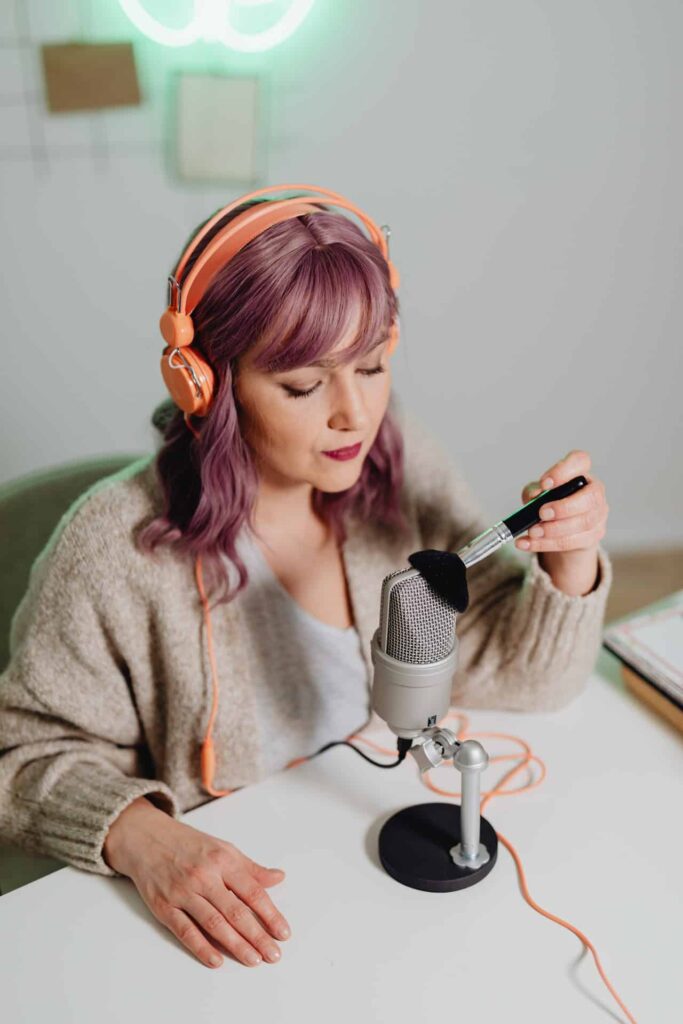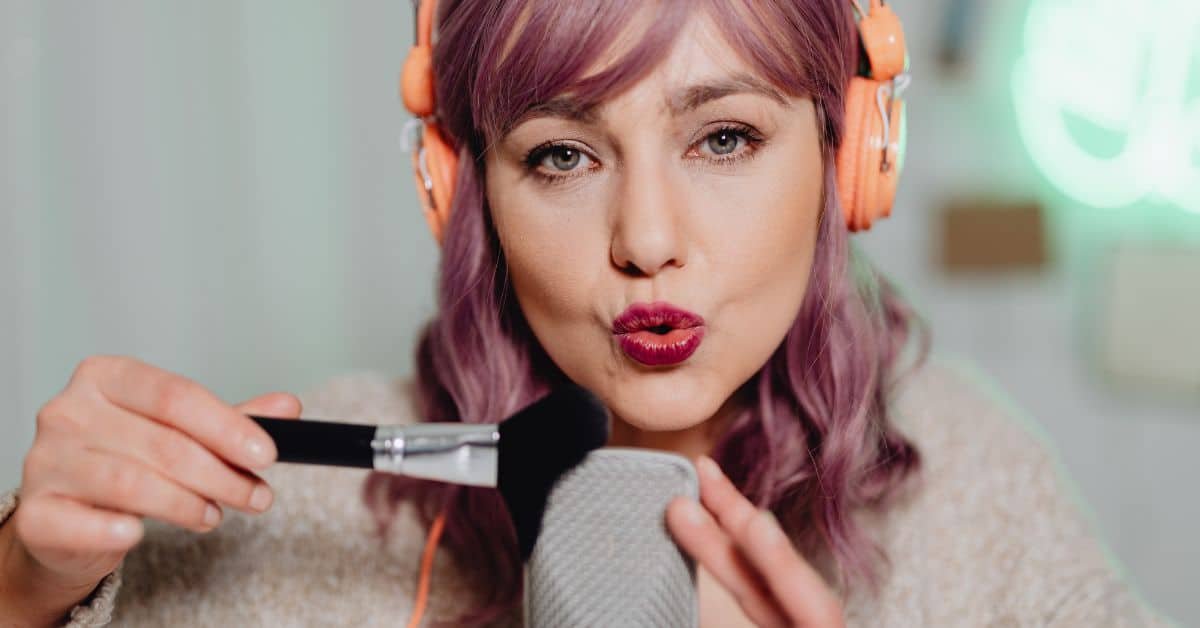Whispering, tapping, brushing, little roleplay, doing your makeup. How about a relaxing head massage?
Welcome to the blissful world of ASMR. Well, it’s blissful for me, anyway. I’m one of those who experience these pleasant, tingling sensations.
Why do some people experience ASMR while others don’t?
Are autistic people more likely to experience ASMR?
What is ASMR?
The term ASMR means autonomous sensory meridian response. It’s a tingling, relaxing sensation that some people experience from certain types of stimuli.
ASMR involves a pleasant tingling that starts from the top of the head and spreads to the neck and back.
These are some of the most common ASMR triggers:
- Whispering
- Soft voices
- Personal attention
- Tapping
- Page flipping
- Scratching
- Roleplay
- Typing
- Slow movements
Not all people experience ASMR. And those who do, don’t necessarily get ASMR from all triggers. Most people have their favorite videos that work for them.
People watch ASMR videos to reduce stress and anxiety and fall asleep faster.

The bliss of ASMR
I’m one of those people who experience ASMR. I got unintentional ASMR long before ASMR videos were popular. I have experienced tingles since childhood.
I’ve been watching ASMR videos for years. My favorite types of videos are roleplay and personal attention.
Autistic people often have sensory sensitivity. I have lots of sensory sensitivity, especially from auditory stimulation.
I wonder if that is why I find ASMR videos so relaxing. Sounds are the most efficient trigger in these videos.
The world is full of loud noises and bright lights that overstimulate my brain. The soft, relaxing world of ASMR is the opposite. It’s like a sensory spa that allows me to recover.
The brain-melting relaxation of ASMR wipes off my irritability, anger, and overthinking.
Research shows that ASMR is a physiological experience that benefits mental and physical health.
Participants who experienced ASMR reported increased excitement and calmness and decreased stress and sadness after watching a range of ASMR videos. The study also showed physiological changes in the ASMR participants, such as reduced heart rate.
Why do some people experience ASMR and others don’t?
The study reveals differences between the participants who experience ASMR and those who don’t. The ASMR participants were significantly less agreeable and less conscientious than non-ASMR participants.
An online survey shows similar results; ASMR participants were less agreeable and conscientious than non-ASMR participants. The survey also revealed that ASMR participants were significantly less extroverted and significantly more neurotic and open to experiences.
Research suggests that people who experience ASMR may be unable to inhibit sensory-emotional experiences.
That describes me. Sensory stimulation triggers strong emotional responses in me, positive or negative. When I’m exposed to bright fluorescent lights, I get angry, depressed, and panicky. ASMR videos trigger calm and pleasant feelings in me.

There is also scientific proof that people who experience ASMR are more empathic and fantasizing.
There is a common misconception that autistic people don’t feel empathy.
That is false, and I find the claim insulting. I’m autistic, and I’m an overly empathic person. So, that’s another trait that might explain why I experience ASMR. I also fantasize a lot.
Does ASMR work for autistic people?
Are autistic people more likely to experience ASMR than neurotypical people?
There is no research on the topic, which doesn’t surprise me. Most scientific research on autism seems to focus on a) what is wrong with autistic people or b) how to make autistic people act more like neurotypicals. Researchers show little interest in studying what could help autistic people reduce their stress and anxiety.
We need to rely on anecdotes on whether autistic people enjoy ASMR.
Apparently, all autistic people don’t enjoy ASMR. Based on this Quora thread, some people with ASD genuinely hate it.
For some people, sensory sensitivity can make ASMR triggers unpleasant. I don’t enjoy all ASMR triggers either. Some just don’t give me any tingles. Others feel downright creepy.
For example, eating sounds (yes, some people enjoy ASMR videos with those) feel very uncomfortable for me. So, I don’t watch those kinds of videos. There’s plenty to choose from.
I think autistic people might be more divided when it comes to ASMR. For some people, like me, watching ASMR videos triggers intense pleasure. For other autistic people, ASMR videos feel uncomfortable.
There might be more neurotypical people who get no reactions from ASMR, positive or negative. Sensory sensitivity is more common in people with ASD, so we could be more likely to experience intense reactions.
I started my own ASMR channel
I love ASMR videos so much that I started my own ASMR channel.
One of my autistic traits is that I always talk too quietly. Since I was a child, no one could hear what I said. I’m tired of people asking “What?” every time I speak.
As an ASMRtist, the quiet, soft voice that people have complained to me about for my whole life could be an asset. That alone is mindblowing.
Also, I have a good imagination, and I love roleplays.
I tried making YouTube videos in which I talked in a “normal” voice, and I didn’t enjoy that. As usual, I was concerned no one would hear me. And I don’t like making videos in which I’m myself. I prefer to play a character. That’s what I can do in ASMR videos.
Of course, I also have ADHD. That’s why I often get excited and start something new. Then, I get bored and quit. I don’t know if that will happen with my ASMR channel. Only time will tell.
Starting an ASMR channel felt right, so that’s what I did. I enjoyed making my first ASMR video. I was surprised that shooting the video was relaxing.
The more relaxed and less stressed you feel, the better the quality of your life. I have experienced anxiety and sleep issues for most of my life. If devoting more time to ASMR helps me relax, it must be the right path.
Here’s my first ASMR video if you’re interested:
ASMR - A blissful mystery
ASMR is a pleasant, tingling sensation some people experience from specific triggers.
Research shows that people who experience ASMR get many mental and physical health benefits.
Studies show that people who experience ASMR have some common traits:
- Less agreeable and less conscientious than people who don’t experience ASMR
- An inability to inhibit sensory-emotional experiences
- More empathic and fantasizing
- Less extroverted
- More neurotic
- More open to experiences
Some autistic people find ASMR videos very relaxing, while others find them unpleasant.
Hopefully, future scientists will get more interested in researching how autistic people could reduce their stress and anxiety. At the moment, there is no research on autistic people and ASMR.
I have experienced the benefits of ASMR. ASMR has helped me reduce my stress and anxiety. It helps me relieve irritability and depression triggered by my SSRI withdrawal process. When I watch ASMR videos, I fall asleep faster.
My ability to experience ASMR may result from my personality traits. Yet my sensory sensitivity most likely contributes to my ASMR experiences.
ASMR proves it: Sensory sensitivity has its upsides.
Do you find ASMR videos relaxing? Which ASMR triggers work for you? Please let me know in the comments.
Read next:








My autistic daughter finds the sound of scrunching slime relaxing. She either does it herself or watches ASMR videos. It helps her so much with her anxiety. Like you she hates the sound of people eating. If she’s having a bad day I have to eat in a different room!
Thank you for sharing! I haven’t watched slime videos, but sounds like it might be relaxing.